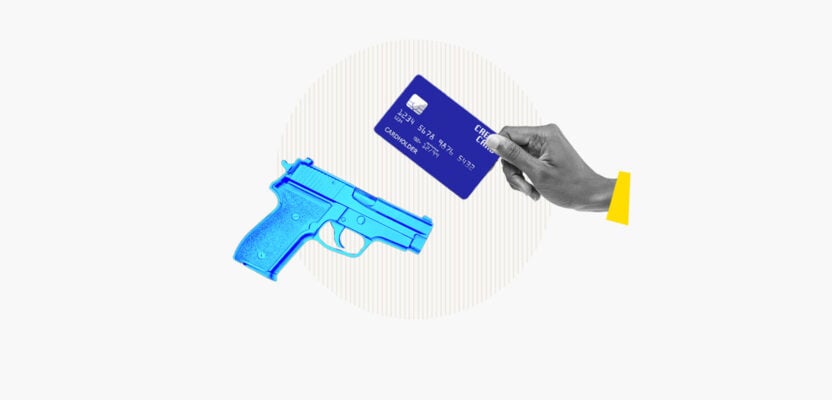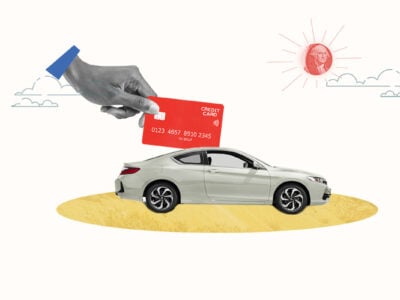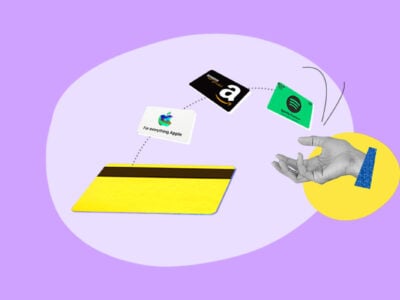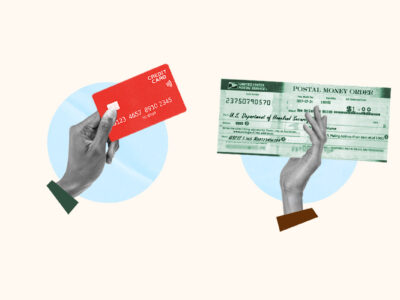Credit cards can be found in more than 75% of US households, and they’ve become central to American society. 1 These days, you can use a credit card to buy nearly anything—including a gun.
However, in response to the call for increased gun regulation, buying firearms with credit cards has become harder. Gun purchases made with credit cards can be tracked, and there are other downsides you need to be aware of before you swipe or tap your card to buy a gun.
Table of Contents
Why you can’t always use a credit card to buy a gun
In order to accept credit card payments, retailers (gun stores) need to use a credit card processor. Many processors have service agreements that forbid transactions involving weapons (including guns, ammunition, and firearm accessories) because they’re considered “high-risk purchases.”
That’s not because they think guns themselves are too dangerous, but rather because transactions involving guns have a high risk of being disputed later (e.g., due to fraud) and because the laws that govern gun purchases vary by state and change frequently.
If you’ve tried to buy a gun by credit card and the transaction was declined, then the company or person selling you the gun isn’t the one to blame—instead, it’s the payment processor.
You won’t be allowed to buy a gun by credit card using any of the payment processors listed below:
Payment Processors That Prohibit or Restrict Gun Transactions
| Payment Platform | Gun Sale Policy |
|---|---|
| PayPal | Prohibited |
| Apple Pay | Prohibited |
| Amazon Pay | Prohibited |
| Google Pay | Prohibited |
| Venmo | Prohibited |
| Zelle | Prohibited |
With that said, there are several payment processors that do allow credit card transactions related to the sale of firearms, including Maverick. 2
For obvious reasons, specialized firearm retailers and gun show merchants tend to use these processors. General-purpose merchants (such as Walmart) are less likely to use them, so it’s harder to buy a gun with a credit card at stores like that.
What you need to know about buying a gun by credit card
As long as your preferred retailer works with a payment processor that allows it, you can buy a gun with a credit card. However, there are several important caveats that you should know about before you go through with the purchase.
1. Credit card companies can now track gun purchases
In September 2022, the International Organization for Standardization (ISO) agreed to establish a new merchant category code for gun retailers, which allows banks and credit card companies to track the sale and purchase of firearms by credit card. 3
Merchant category codes are nothing new—they’re simple, four-digit numbers that allow financial institutions to categorize purchases. Previously, guns were classed under generic merchant codes for “miscellaneous retail stores” or “sporting goods stores.”
Now, banks and credit card companies have the option to assign a gun-specific code to companies that sell firearms. They can then use these records to track your gun purchases and even report your credit card activity to the authorities if it seems suspicious.
2. You may have to pay extra fees
Many merchants and retailers charge a small fee for credit card transactions to cover the credit card processing fee they’ll have to pay when you use your card.
This also isn’t unique to guns—stores may require you to pay a card transaction fee for any purchase you make with them. However, if the fee is a percentage of the transaction amount (e.g., 2–3%), you could end up having to pay a lot more for a higher-cost item like a firearm.
3. Guns may be excluded from your credit card’s purchase protection
Many credit cards come with basic purchase protection or extended warranties for items you buy using your credit card. However, some card agreements exclude guns from these benefits (for instance, Wells Fargo’s cardholder agreements specifically exclude “firearms, weapons, and ammunition”). 4 5
This means if your gun turns out to be faulty or unsatisfactory, you won’t necessarily be able to file a credit card claim to get your money back if the retailer won’t accept your return request.
To find out if your card has restrictions like this, check your credit card terms and conditions or call your card issuer’s customer service line.
4. Gun laws and regulations still apply to online purchases
Using a credit card to buy a gun online isn’t a way to get around federal or state gun regulations. Online gun transactions are subject to the same regulations that apply to brick-and-mortar stores that sell firearms. 6
This means you’ll still need to fill out paperwork and undergo a background check to buy a gun from an online retailer who holds a federal firearm license (FFL). The same is true if you’re buying the gun from a private dealer who’s planning on shipping the gun to you from out of state.
Under federal law, a private gun dealer can’t ship a gun directly to you from another state. 7 They’ll need to first send it to a federal firearms licensee in your state. Then you’ll need to go through a background check and fill out relevant paperwork before you can receive it.
Should you buy a gun with a credit card?
Gun enthusiasts and collectors have conflicting opinions on whether it’s a good idea to buy a gun by credit card. Many people may say that paying for a gun in cash is better than paying by card since you’ll have more privacy and negotiating power (and can avoid those added fees).
However, buying a gun on credit can sometimes come with benefits as well. Depending on the type of credit card you have, you may even be able to get 0% APR financing for your gun (equivalent to an interest-free payment plan) or even earn credit card rewards on your purchase.
We’ve summarized the pros and cons of buying a gun on credit below.
Pros and Cons of Buying a Gun with a Credit Card
Ultimately, it’s up to you. Whatever you choose to do, carefully weigh up the pros and cons. Make sure to check whether your card will even be accepted at your chosen store, and come up with a budget so you don’t get stuck with more credit card debt than you can handle.






